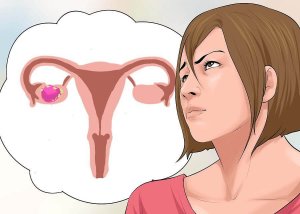The Side Effects of Ovarian Cancer

The side effects of ovarian cancer are many. It’s due to the uncontrolled growth of cells and might involve the formation of tumors in the area and also spread to other parts of the body. The treatments for this disease have a series of side effects as you’re about to see below.
Treatment for ovarian cancer can range from various surgical interventions to radiotherapy and the use of chemotherapy. All these treatments are aggressive and alters the structure of the cells of the body.
Side effects of surgical interventions for ovarian cancer
In the short term, women undergoing surgery experience pain and tenderness, as with any invasive procedure. Other common symptoms include difficulty urinating and defecating.
However, serious unwanted reactions are also possible. The following are some of the effects and consequences that an ovarian cancer patient may face during surgical treatment for this difficult disease.
1. Effects of anesthesia

The anesthetic treatment for all types of surgeries can cause some side effects that aren’t necessarily serious, but they may be uncomfortable and cause problems in the short or medium term. Some of the negative side effects of general anesthesia include respiratory or cardiac problems, blood clots, hemorrhages, and infections.
However, each person’s response to general anesthetics is different and there may be serious complications. Respiratory and cardiac problems, blood clots, bleeding and infections are some of them.
We recommend reading How Is Ovarian Cancer Detected
2. Effects on the body
During surgery, certain parts of the body will be directly affected, including the bladder, blood vessels, the intestines, and the lymph nodes. In some cases, it may be necessary to remove the lymph nodes in a patient’s pelvis due to the presence of malignant cells.
If this is the case, there’s a risk that the lymphatic system will break down and lead to lymphedema. This causes the legs to fill with fluid, leading to swelling.
3. Extreme side effects of ovarian cancer
There is a chance that during the surgery to remove any tumors it will be necessary to remove small portions of abdominal organs, such as the intestines, for example. It may also be necessary to remove part of the liver, gallbladder, or spleen.
It’s possible that when surgery is underway the patient will lose her ability to bear children. A woman will have to undergo fertility conservation planning prior to the surgery if she wants to have children.
We invite you to read The 6 Most Common Causes of Infertility in Women
The side effects of chemotherapy for ovarian cancer
Chemotherapy is one of the most widely used treatments for ovarian cancer. However, it can lead to multiple side effects. These vary depending on the drug used.
The occurrence of side effects of chemotherapy as a treatment for ovarian cancer will also depend on a woman’s age. In fact, a recent study states that older women tend to develop more unfavorable reactions than younger ones. Fortunately, most of the effects disappear at the end of the treatment.
Common side effects
- Total or partial hair loss
- Excessive fatigue
- Hemorrhages and infections caused by a loss of red blood cells
- Anemia
- Nausea, vomiting, and watery stools (diarrhea)
- Canker sores and a loss or change in sense of taste
- Cramps or tingling due to damage to peripheral nerves
- Mild pain in the ears and muscles
- Redness, darkening, and inflammation of the skin
- Memory or concentration problems
Less common side effects
- Blurry vision
- Low blood pressure
- Abdominal pain
- Allergic reactions
- Headaches or migraines
The effects of radiation
Some chemotherapy drugs used in the treatment of ovarian cancer can bring about long-term side effects. Most of these are due to the damage they cause in certain organs and some of the most common are:
- Renal insufficiency
- Peripheral neuropathies due to nerve involvement
- Hearing loss
- Premature menopause and infertility
- Permanent bone marrow damage
Effects of radiation therapy
The effects of radiation therapy and chemotherapy are the same. However, patients exposed to radiation therapy are also at risk for digestive problems.
In fact, a study published in the journal Scientific Reports showed that radiotherapy tends to generate gastrointestinal and hematological toxicity in women with ovarian cancer. Fortunately, there are multiple drugs capable of treating and preventing the appearance of such side effects.
Remedies for reducing the side effects of ovarian cancer
Nature provides us with the tools to heal ourselves when facing a degenerative disease like cancer. Certain edible plants are great for reducing some of the side effects of ovarian cancer treatments. Let’s take a closer look at some of these medicinal plants.
1. Mint tea

The antioxidant properties in mint tea will strengthen your immune system and help your body prevent and fight diseases like ovarian cancer. It can also soothe an upset stomach, one of the most common symptoms associated with this disease.
Ingredients
- 7 to 10 mint leaves (1 g)
- 1 c. of water (250 ml)
- Honey or lemon juice to taste
Preparation
- Firstly, bring the water to a boil
- Then, add the mint leaves
- Then, remove it from heat at and allow it to steep
- Finally, add the honey and/or lemon juice for flavor
You can drink this tea at any time during the day. However, it’s best to have a cup in the morning
2. Shiitake mushrooms
These mushrooms contain beta-glucan, a chemical that can inhibit certain types of cancer. Shiitake mushrooms are common in Japan where people use use them to treat ovarian cancer and other diseases.
In fact, multiple studies show that shiitake mushrooms possess anti-cancer properties as they’re rich in lentinan. This beta-glucan can enhance the effectiveness of chemotherapy and radiotherapy.
Ingredients
- 12 fresh shiitake mushrooms
- A bunch of scallions (200 g)
- Sea salt
- 1 tbsp. of sunflower oil (15 g)
- 1 small head of romaine lettuce
- 2 tbsp. of lemon juice (30 ml)
- 2 tbsp. of soy sauce (30 ml)
- ½ tbsp. of mirin (7.5 g)
Preparation
- Firstly, make a star cut in the cap of the shiitake mushrooms
- Then, slice a little bit off the stalk
- Chop the scallions and add the sea salt
- Place this mixture on a grill or saute until golden brown
- Then, mix the liquid ingredients to make the sauce
- Wash the lettuce and dry it well
- Then, tear the leaves into pieces
- Finally, toss everything together in a salad bowl
Preventable side effects of ovarian cancer
As you can see, treatment for ovarian cancer has multiple side effects, especially when it comes to chemotherapy. Fortunately, nowadays there are medications capable of alleviating these reactions and making the process more tolerable. Thus, consult your physician to clear any doubts.
All cited sources were thoroughly reviewed by our team to ensure their quality, reliability, currency, and validity. The bibliography of this article was considered reliable and of academic or scientific accuracy.
- Carelle N, Piotto E, Bellanger A, Germanaud J, Thuillier A, Khayat D. Changing patient perceptions of the side effects of cancer chemotherapy. Cancer. 2002;95(1):155-163.
- Monsuez J, Charniot J, Vignat N, Artigou J. Cardiac side-effects of cancer chemotherapy. International Journal of Cardiology. 2010;144(1):3-15.
- Szotek P, Pieretti-Vanmarcke R, Masiakos P, Dinulescu D, Connolly D, Foster R et al. Ovarian cancer side population defines cells with stem cell-like characteristics and Mullerian Inhibiting Substance responsiveness. Proceedings of the National Academy of Sciences. 2006;103(30):11154-11159.
- Goto E, Hosomi M, Nishihara M, Goto M, Yoshida M, Kii T, Kuwakado S, Nishitani H, Kawaharada T, Takiuchi H. [Comparison of chemotherapy side effects between elderly and young subjects]. Gan To Kagaku Ryoho. 2012 Dec;39(13):2527-31.
- Yang H, Zhang K, Liu Z, Wang T et al. Clinical analysis of conformal and intensity-modulated radiotherapy in patients with recurrent ovarian cancer. Sci Rep. 2020 Oct 14;10(1):17172.
- Zhang M, Zhang Y, Zhang L, Tian Q. Mushroom polysaccharide lentinan for treating different types of cancers: A review of 12 years clinical studies in China. Prog Mol Biol Transl Sci. 2019;163:297-328.
This text is provided for informational purposes only and does not replace consultation with a professional. If in doubt, consult your specialist.








